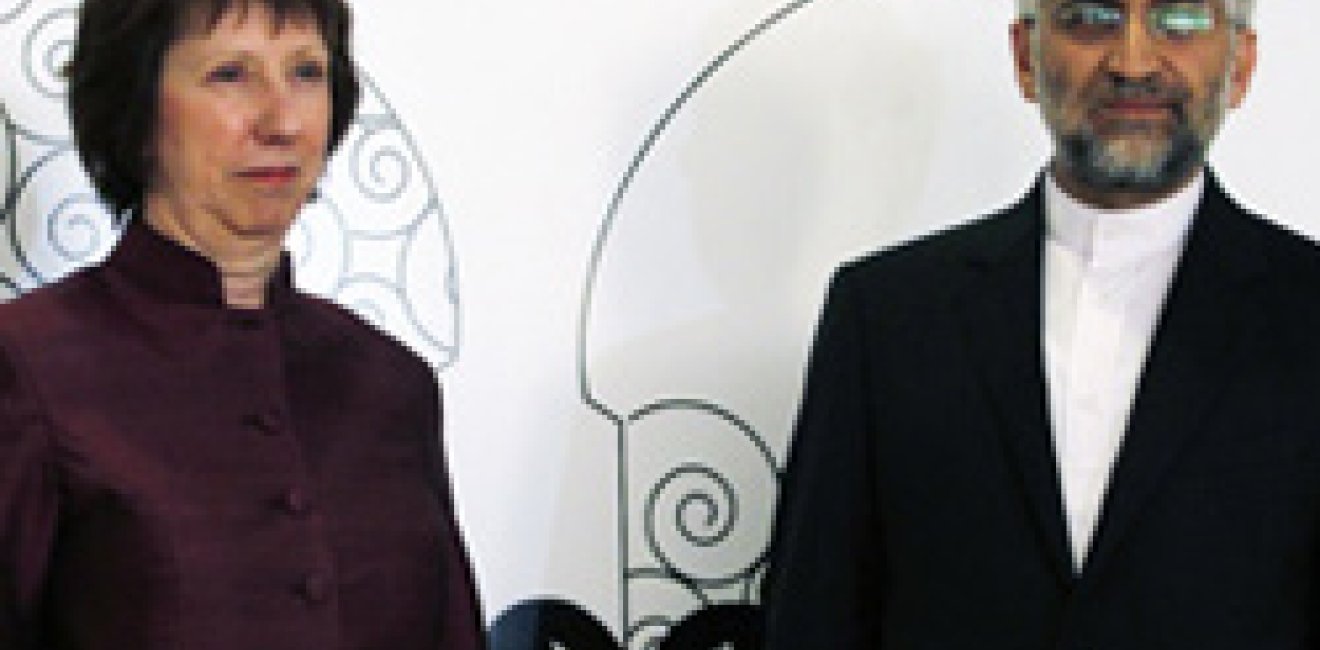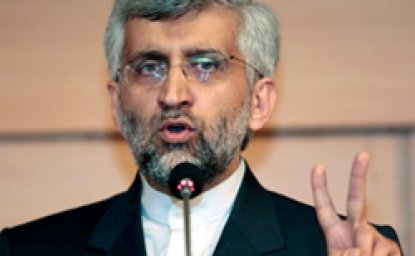Talks with Iran over its alleged pursuit of nuclear weapons ran into a reality check in the latest round in Baghdad. Iran brushed aside calls for it to stop enriching uranium to a level close to weapon-grade by saying that its right to enrichment should not be challenged. Iranian representative Saeed Jalili also made clear that the United States and its negotiating partners will have to think twice about maintaining tough sanctions against the Islamic Republic if they expect it to make concessions.
The talks were supposed to last one day on Wednesday but they stretched into two. It seemed at times as if they were about to fall apart, with journalists on alert several times Thursday for a closing press conference that was put off as the negotiators huddled anew. The Baghdad meeting followed a first round of fresh-start negotiations in Istanbul last month. They were heralded as a success because the two sides managed to discuss the nuclear issue without veering into the sort of rhetoric, confrontation and breakdown in dialogue that had marred earlier efforts. People were looking to the Baghdad talks as a chance to lay down proposals and begin serious haggling toward an agreement.
This is not what happened. Catherine Ashton, the European foreign-policy representative who speaks for the six negotiating powers—the U.S., Russia, China, Britain, France, and Germany—told a press conference after the meeting that “significant differences remain.” She insisted that both sides “want to make progress, and that there is some common ground.” But somewhat tellingly she said: “We do agree on the need for further discussion to expand that common ground.” More talks are scheduled for next month in Moscow.
A fundamental divide came to light in Baghdad. The U.S. led the six powers in calling on Iran to suspend its 20 percent enrichment, the higher level Tehran says it is doing for a research reactor that makes medical isotopes. Enrichment refines uranium to be fuel for power reactors, but at levels over 90 percent it can be used for the explosive core of atom bombs. The six powers also called on Iran to ship out the uranium it has already refined to 20 percent and to stop work at its Fordow enrichment plant, which was built under a mountain and is believed to be impregnable to air attack. At the same time, the U.S. and the European Union want to not just maintain the current economic sanctions against Iran, but to add even tougher measures come July—sanctions against Iran’s central bank and the country’s ability to sell oil and do business internationally.
Iran wants sanctions lifted, or at least for the central bank and oil measures to be postponed as talks proceed. It thought, or at least said, that this is where it judged the six world powers were heading after saying in Istanbul that they accepted the principle of reciprocity in taking confidence-building steps. In Baghdad, the U.S. did offer a sort of reciprocity, namely that no new sanctions would be imposed and that Iran would get such goodies as parts, which are currently sanctioned, for its ailing fleet of U.S.-made planes, fuel for the research reactor in Tehran that has become the rationale for making 20 percent-enriched uranium, and help in safety at that reactor. But at no time has Washington been close to postponing the central bank and oil sanctions, mainly because it considers enrichment in general, and not just 20 percent enrichment, to be the real problem. The United Nations, for instance, has called on Iran to suspend all enrichment in order to prove it does not seek nuclear weapons. The U.S. and Europe want to keep up the pressure on Iran to persuade it negotiate for real. A European diplomat who was in on the talks said the negotiating process had begun in Baghdad and that “whenever you get into substance, it takes more time.”
A senior U.S. official was even more positive. The official said: “We knew these were going to be difficult talks, because obviously we are far apart.” But there is “agreement to deal with all aspects of 20 percent enrichment, step by step, on the basis of reciprocity.”
In Istanbul, the United States and Iran were just “reacquainting with each other” and that process was still continuing after decades of enmity and isolation, the official said. In a surprising moment, according to the official, Jalili approached the U.S. representative, Undersecretary of State Wendy Sherman, “to chat for a minute or two.” This was despite the fact that Iran had turned down holding bilateral talks with the United States, after doing bilaterals with Russia, China, and Ashton outside the regular plenary sessions.. Jalili’s gesture of a chat, however, was “recognition that we are beginning to understand, to communicate with each other and talk to each other,” the U.S. official said.
Jalili told reporters that “what has ended today is the approach of ratcheting up pressure on Iran” and that “the approach of cooperation” must now be used.
The U.S. and other officials said it was also an achievement that the two sides had agreed to another meeting, and in fairly short time, especially because the Baghdad meeting was about to break up without a date and place for the next talks. “The Iranians had been singularly reluctant to propose a date,” a diplomat said. That date was nailed down at a last-minute trilateral meeting of Iran, Russia and China, joined finally by Ashton, who said it would be “so much nicer” to end in Baghdad with the next meeting set, said the diplomat.
This is an optimistic way of looking at things. The more pessimistic view is that Baghdad showed that Iran’s dealings with the U.S.-led negotiating states represent the same dialogue of the deaf that has characterized the Iranian nuclear crisis since it began in 2002, when an Iranian resistance group showed that Iran had been hiding suspicious nuclear work for almost two decades. Iran claims its nuclear program is a peaceful effort for civilian ends, and that it will never give up its right to enrichment. It sees the lifting of sanctions as the price to pay for sitting down to talk. Iranian student news agency Isna attacked the six powers’ insistence that Iran make concessions on enrichment with no sanctions relief in return as “not balanced.” Jalili told reporters that “what has ended today is the approach of ratcheting up pressure on Iran” and that “the approach of cooperation” must now be used.
Jalili put forth a plan of his own, which included non-nuclear issues such as Iran’s concern about foreign interference in Bahrain and Syria. Diplomats said Jalili did not “relentlessly” call for sanctions to be lifted, as he had in Istanbul. Instead, he insisted that progress could not be made until the international community acknowledged Iran’s “inalienable” right to enrich uranium, as specified in the nuclear Non-Proliferation Treaty. He fell short of making this a precondition for talks, a requirement that had scuttled earlier attempts at negotiation. But he went in that direction.
This is also a reality check because Israel, which is a player at the negotiations without being present, charges that Iran is using talks in order to gain time while it develops its nuclear capabilities further. Israeli Defense Minister Ehud Barak said Wednesday that even Iranian cooperation with UN nuclear inspectors, which Iran promised in Tehran this week, would not rule out a possible Israeli military strike. Israeli Prime Minister Benjamin Netanyahu has already warned that Iran is using the talks as a “freebie” to hold off the international community while it builds more centrifuges and moves closer to developing fissile material it can use in bombs.
But Israel is for the moment a spectator and, in fact, restricted in how aggressive it can be as long as the talks continue. In the end, positions were staked out in Baghdad and will have to play out, starting in Moscow. Progress will not be easy.
This article originally appeared on The Daily Beast.






